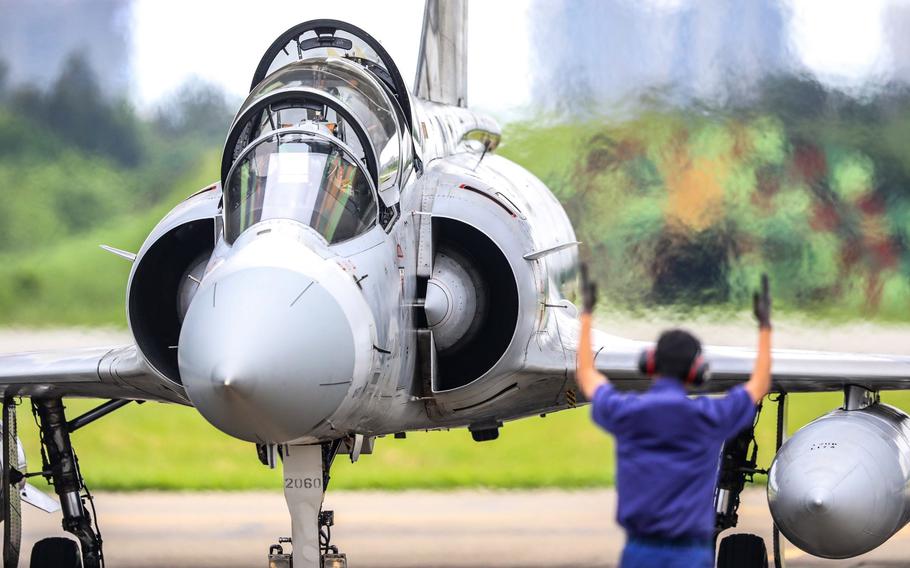
A Taiwanese Dassault Mirage 2000 fighter jet prepares for take off in this undated photograph. (Taiwan Ministry of National Defense)
Scores of Chinese warships and aircraft were active around Taiwan on Thursday night and Friday morning as exercises meant to discourage “Taiwan independence” moved into their second day.
The exercises, dubbed Joint Sword 2024A, kicked off Thursday morning in what China’s Eastern Theater Command described as “a powerful punishment for the ‘Taiwan independence’ separatist forces seeking ‘independence,’ ” according to a post on the Weibo social media site Thursday.
The exercise included combat patrols and “joint precision attack” drills and was scheduled to conclude Friday, the command wrote in another post.
Between 6 p.m. Thursday and 6 a.m. Friday, 49 Chinese aircraft, 19 warships and seven coast guard vessels were active in the waters and skies around Taiwan, Taiwan’s Ministry of National Defense said in a Friday post to X, formerly Twitter.
Taiwan in response established a response center and strengthened “joint intelligence, surveillance and reconnaissance activities to prepare for emergencies,” the ministry said Thursday in a news release.
The ministry expressed “regret for such irrational provocations” and said its forces were dispatched to take “practical actions to protect the freedom, democracy and sovereignty” of Taiwan.
Beijing doubled down on its rhetoric Thursday evening, with China’s Foreign Ministry spokesman Wang Wenbin stating that Taiwanese independence was “doomed to fail,” according to the ministry’s transcript of Wang’s news conference.
“Anyone seeking ‘Taiwan independence’ will find themselves crushed by the historic trend of China’s complete reunification,” he said.
Taiwan split from China in 1949 following a more than 20-year-long civil war and has remained a self-ruling island since. China views Taiwan as a breakaway province that must be reunified with the mainland, by force if necessary.
The drills came just three days after Taiwan inaugurated President Lai Ching-Te, a member of the Democratic Progressive Party, who pledged to continue the efforts of his predecessor, Tsai Ing-wen. Beijing routinely described Tsai as a separatist during her 8-year tenure as president.
Lai, during his inauguration speech on Monday, called on China to “face the reality of [Taiwan’s] existence, respect the choices of the people of Taiwan, and in good faith, choose dialogue over confrontation,” according to a transcript posted online by Taiwan’s Office of the President.
Beijing was expected to respond to Lai’s remarks, according to Carlyle Thayer, an emeritus professor at the University of New South Wales at the Australian Defence Force Academy. The drills also fell within China’s three primary forms of warfare—–psychological, information and legal — he told Stars and Stripes by email Wednesday.
China reacted similarly in 2023 when Tsai met former House Speaker Kevin McCarthy in California and in 2022 when McCarthy’s predecessor Nancy Pelosi visited Taiwan.
Those drills allowed Beijing to “exercise critical elements of potential military invasion,” according to Lt. Gen. Stephen Sklenka, deputy commander of U.S. Indo-Pacific Command.
“I cannot underscore enough how devastating conflict in the Indo-Pacific region would be,” Sklenka said Thursday, according to a video by ABS-CBN News Channel of his remarks at the National Press Club of Australia.
“At stake would be untold numbers of lives, trillions of dollars in global economic damage and the maintenance of an international order that’s delivered relative peace and stability over the past 80 years,” he said in Canberra, Australia.